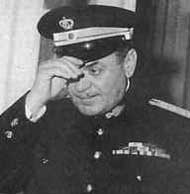George Papadopoulos
|
|
George Papadopoulos (Greek Γεώργιος Παπαδόπουλος, Georgios Papadopoulos, (May 5, 1919 – June 27, 1999) was the head of the military coup d'état that took place in Greece on April 21 1967 and leader of the military government that ruled the country during the period 1967 - 1974.
| Contents |
Early life and varied World War II military career
Papadopoulos was born in Elaiohori, Achaea to school teacher Christos Pappadopoulos and his wife Chrysoula. He had two brothers, Constantine and Haralabos. He received a Secondary education and during 1937, enlisted in the Hellenic Army Academy. He completed his three-year education in 1940.
Graduates of the 1940 class would soon be introduced to war. On October 28, 1940, Prime Minister of Greece, Ioannis Metaxas, refused to allow the Italian army to cross the borders between Greece and Albania. Prime Minister of Italy, Benito Mussolini had already issued orders for an invasion in that event. Thus, Greece entered World War II. George saw field action as a Second Lieutenant of the Artillery against both the Italians and the forces of Nazi Germany, who joined them on April 6, 1941.
The Wehrmacht captured Athens on April 27, 1941. Following their victory in the Battle of Crete (May 20 - June 1, 1941), Greece was placed under the combined occupation of Nazi Germany,Italy and Bulgaria. A resistance movement soon emerged, including several organizations varying in ideological conviction, popular support, and area of activity. Significant among them was the left-wing Ethnikos Laikos Apeleftherotikos Stratos (ELAS), formed by the Communist Party of Greece (KKE) and the strongest group numerically. Papadopoulos, a staunch anti-communist, decided to become a captain in a security battalion run by the pro-German puppet government instead of further resisting them.
Beloyannis trial
Papadopoulos was also a member of the court-martial that sentenced Nikos Beloyannis to death for treason in 1951. The trial has been criticized for procedural irregularities, allegedly flawed evidence (including problematic "Soviet" decrypts), and its military nature (the Greek state was not in a declared war against a foreign power, but rather a domestic insurgency—which was, however, supplied from abroad).
KYP
Pappadopoulos served at KYP (Kentriki Ypiresia Pliroforion – the former Greek intelligence agency) from 1959 to 1964, and became a colonel in 1967.
1967 coup
The same year, on April 21, Papadopoulos led a successful coup with fellow officers, taking advantage of the volatile political situation that had arisen from a conflict between King Constantine II and the aging prime minister, Georgios Papandreou. Many observers characterize his subsequent rule, as heavy-handed. Henry Tasca, American Ambassador to Greece, called the military government "the most anti-communist group you'll find anywhere."
Banned works
The military government banned the works of Aristotle, Sophocles, and Jean-Paul Sartre, modern mathematics. They also clamped down on left wing organizations, labor unions, and promoted modest dress in women and Greek culture.
During the Cold War, Pappadopoulos's government was supported by the United States against Soviet and communist agents. He is believed to have had personal connections with the Central Intelligence Agency.
Deposition of the the military government
His government was overthrown on November 25 1973 by members of his own administration, after the student uprising of November 17 at the National Technical University of Athens. Due to his extensive reliance on the army to quell the student resistance, General Dimitrios Ioannides saw an opportunity and replaced him as the head of government.
After democracy was restored in 1974, Papadopoulos was tried along with his colleagues for treason and insurrection and received the death penalty, which was later commuted to a life sentence. Papadopoulos remained in prison, rejecting amnesty, until his death at age 80, when he succumbed to cancer.
Legacy
Today, Papadopoulos is a symbol of authoritarianism for many Greeks, some of whom characterize him one of the most despised persons in recent Greek history. After the restoration of democracy, there was still some support for the politics of Papadopoulos, represented by a political party (ΕΠΕΝ - EPEN). Today, EPEN has dissolved, with supporters moving on to various other political parties.
| Preceded by: Constantine Kollias | Prime Minister of Greece 1967–1973 | Succeeded by: Spiros Markezinis |
| Preceded by: George Zoitakis | Regent of Greece 1972–1973 | Succeeded by: monarchy abolished |
| Preceded by: Constantine II (King of the Hellenes) | President of Greece 1973 | Succeeded by: Phaidon Ghizikis Template:End boxpt:Georgios Papadopoulos de:Georgios Papadopoulos nl:Georgios Papadopoulos pl:Georgios Papadopoulos |

